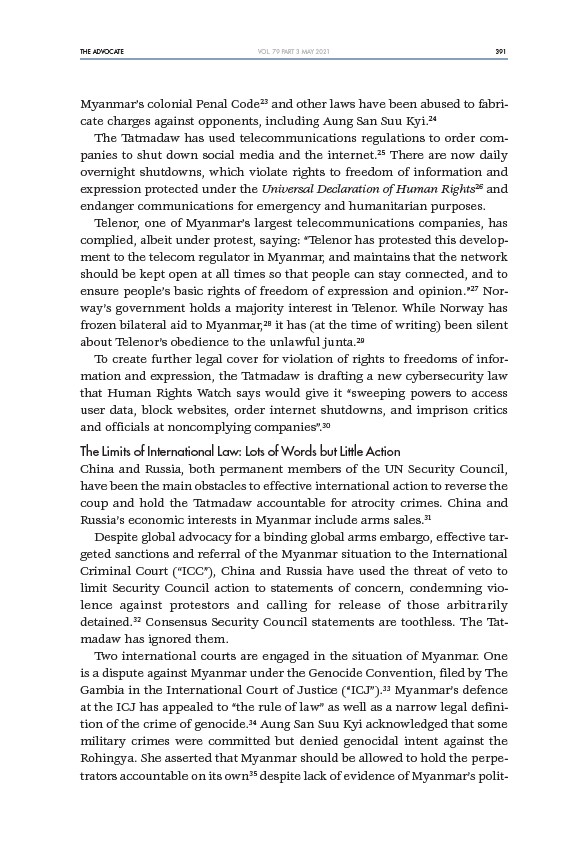
THE ADVOCATE 391
VOL. 79 PART 3 MAY 2021
Myanmar’s colonial Penal Code23 and other laws have been abused to fabricate
charges against opponents, including Aung San Suu Kyi.24
The Tatmadaw has used telecommunications regulations to order companies
to shut down social media and the internet.25 There are now daily
overnight shutdowns, which violate rights to freedom of information and
expression protected under the Universal Declaration of Human Rights26 and
endanger communications for emergency and humanitarian purposes.
Telenor, one of Myanmar’s largest telecommunications companies, has
complied, albeit under protest, saying: “Telenor has protested this development
to the telecom regulator in Myanmar, and maintains that the network
should be kept open at all times so that people can stay connected, and to
ensure people’s basic rights of freedom of expression and opinion.”27 Norway’s
government holds a majority interest in Telenor. While Norway has
frozen bilateral aid to Myanmar,28 it has (at the time of writing) been silent
about Telenor’s obedience to the unlawful junta.29
To create further legal cover for violation of rights to freedoms of information
and expression, the Tatmadaw is drafting a new cybersecurity law
that Human Rights Watch says would give it “sweeping powers to access
user data, block websites, order internet shutdowns, and imprison critics
and officials at noncomplying companies”.30
The Limits of International Law: Lots of Words but Little Action
China and Russia, both permanent members of the UN Security Council,
have been the main obstacles to effective international action to reverse the
coup and hold the Tatmadaw accountable for atrocity crimes. China and
Russia’s economic interests in Myanmar include arms sales.31
Despite global advocacy for a binding global arms embargo, effective targeted
sanctions and referral of the Myanmar situation to the International
Criminal Court (“ICC”), China and Russia have used the threat of veto to
limit Security Council action to statements of concern, condemning violence
against protestors and calling for release of those arbitrarily
detained.32 Consensus Security Council statements are toothless. The Tatmadaw
has ignored them.
Two international courts are engaged in the situation of Myanmar. One
is a dispute against Myanmar under the Genocide Convention, filed by The
Gambia in the International Court of Justice (“ICJ”).33 Myanmar’s defence
at the ICJ has appealed to “the rule of law” as well as a narrow legal definition
of the crime of genocide.34 Aung San Suu Kyi acknowledged that some
military crimes were committed but denied genocidal intent against the
Rohingya. She asserted that Myanmar should be allowed to hold the perpetrators
accountable on its own35 despite lack of evidence of Myanmar’s polit-